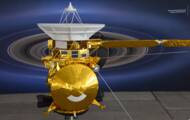After all, the moon won’t just be a piece of ice. In a new study published in the scientific journal Icarus, Alyssa Rhoden, a researcher at the Southwestern Research Institute who studies the world’s oceans, will find evidence of an ocean beneath the icy shell of Mimas, Saturn’s satellite, tells the website. can be destroyed.
Indeed, Mimas has features that allow it to contain the ocean. Its orbit around Saturn is “eccentric”, meaning it is pulled and stretched as it approaches the planet’s gravitational pull and then moves away from it. Each orbit lasts only 22 hours 36 minutes. This process, called “tidal heating,” creates a large amount of heat in oceanic worlds such as Europe, one of Jupiter’s moons.
“We found the right data”
With this event in mind, Alyssa Rhoden follows up on earlier observations of small swings in Mimas’ orbit around Saturn. The sea ice crossing at Mimas might have caused this. Could tidal warming have melted enough ice inside Mimas to create an ocean? If so, there may not be too much heat to melt the ice sheet, or too little to cause the ocean to freeze.
NASA considers robot missions to be comets and Saturn’s moon
The researchers calculated that if there was an ocean within Mimas large enough to cause its oscillations, the water under the ice shell would be 20 to 30 kilometers thick. Therefore, they carried out computer simulations of the effects of warming, due to tides, on the Mimas ice. Unexpectedly, they found the ocean beneath 20 to 30 kilometers of solid ice. “We found the right data,” said Alyssa Rhoden.
However, researchers point out that it is almost certain that Mimas is home to the ocean. But the hypothesis is becoming more and more plausible. And if so, life could have come from there. As NASA explains, “Water tops the list of elements that make life possible. Tidal heating could eventually allow life to thrive,” although there is no evidence of life beyond Earth.
Also read:
Cassini ends its mission to explore Saturn
–
–
On the small moon of Saturn, conditions are favorable for life
–
–

Cassini bows after 13 years exploring Saturn
–
–
–


